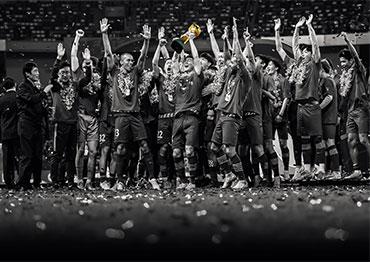Yang Xiaotian told NewsChina how excited he was when Suning bought Jiangsu FC. “We plan to win the CSL championship within three years and the AFC championship within five years,” Zhang Jindong, billionaire entrepreneur and major shareholder in Suning, told media after the deal.
Zhang followed up his claims with big investments. In February 2016, Suning spent 50 million euros (US$61m) on Brazilian player Alex Teixeira, breaking the transfer fee record for China in what was then a buying frenzy. Teixeira’s deal was the third time the record was broken in 10 days. Soon after, Suning splashed out 28 million euros (US$34.1m) on another Brazilian, Ramires Nascimento.
According to German website transfermarkt.com, in 2016, the CSL’s 16 teams spent a combined 300 million euros (US$366m). Jiangsu FC’s share of the buying spree was the biggest, with total transfer fees exceeding 100 million euros (US$122m) that year.
Suning also spent eight months building a training center. Opened in 2017, it consisted of two standard natural grass soccer pitches and a seven-player pitch covered with Bermuda grass used in international competitions. A former employee of Jiangsu FC told NewsChina on condition of anonymity that Suning had sunk at least 5 billion yuan (US$735.5m) into the club over the past five years.
Media dubbed this period of bottomless-pocket purchases the “jinyuan” soccer craze – meaning pricey or moneyball. It began in 2011 when Guangzhou Football Club, then known as Guangzhou Evergrande FC after its owner Evergrande Group, China’s secondlargest property developer, was promoted to the CSL. Well known as a big spender, Evergrande, which bought the club in 2010, pumped up spending on domestic and overseas players and coaches. Guangzhou FC did garner an impressive slate of titles, including eight CSL championships, two AFC championships, two CFA Cup championships and four CFA Super Cup championships. Their success lured other clubs to follow the investment craze.
Data from transfermarkt.com showed that in 2017, 11 of the 16 CSL teams saw their total value exceed 10 million euros (US$12.2m), with that of Shanghai Port FC (previously known as Shanghai SIPG after owners Shanghai International Port Group) rising to 76 million euros (US$92.7), the highest among all Asian professional soccer teams. The website revealed that Shanghai Port spent 60 million euros (US$73.2m) importing Brazil player Oscar Júnior that year, nearly double the value appraised by the website.
These costly players created a bloated payroll. Argentine soccer star Carlos Tévez joined cross-town rival Shanghai Shenhua Football Club in 2016 with an annual post-tax salary of 38 million euros (US$46.4m), even higher than global soccer stars Lionel Messi and Cristiano Ronaldo.
A report in the Shanghai-based Oriental Sports Daily revealed that in 2019, the annual salaries of CSL players totaled 4.8 billion yuan (US$705.8m), 10 million yuan (US$1.5m) per player on average, even higher than that of many English Premier League teams.
“The jinyuan soccer craze took players’ salaries away from their true value and encouraged them to get lazy,” Ma Dexing, associate editorin-chief of Titan Sports Weekly, told NewsChina. “They earned money too easily and even bench-warmers could earn 4-5 million yuan... It made them unwilling to improve themselves,” he added.
To curb the trend, the CFA in March 2018 released a document to cap annual monetary input into professional soccer clubs, including regulating player salaries. The latest update in late 2020 capped investment per CSL club at 900 million yuan (US$132.4m), club players’ annual salaries to 10 million yuan (US$1.5m) before tax and national team players at 12 million yuan (US$1.8m). Soccer stars that signed contracts before the new rules were grandfathered in, including Oscar of Shanghai SIPG, who earns US$25 million, Forbes reported.

 Old Version
Old Version


